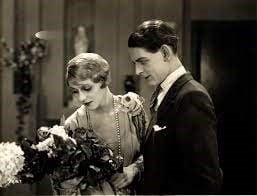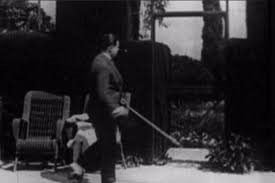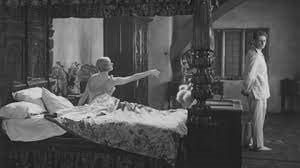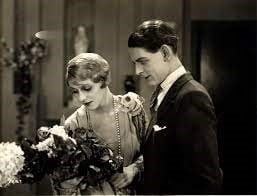
After directing the film adaptation of Downhill, Gainsborough convinced Hitchcock that he should lead another play to film adaptation, this time for the play Easy Virtue. This play was also one of Noel Cowards’ creations, so it was a no-brainer to pair it with Hitchcock once again. Hitchcock, however, was hesitant to direct another adaptation as one suspects even this early in his career, he was looking for a story that would fit his voice a little better. However, the powers won over in the end, and he was attached to Easy Virtue.
The film is about a man named Aubrey Filton. A man who is sure his wife is stepping out on him to have an affair with a young artist (seems to be a theme with these early films). Filton decides he has no other option than to sue his wife for divorce on the grounds of being unfaithful. All through the wife, Larita, swears her innocence in the court, the jury sided with the husband and allowed the divorce to happen. The facts are, however, that Mr. Filton is an abusive alcoholic. He only thinks that the affair happened because of an altercation he had with the artist. The fight occurred while the artist, Claude, was painting a portrait of Larita. He felt for her as he could see the abuse she was receiving from her drunk husband. Claude writes Larita a letter begging her to leave her husband and run away with him with perhaps selfish intentions. Larita declines, but while doing so, her husband walks in and begins to fight with Claude. Claude then fires a gun at Aubrey and misses the first shot. A fight breaks out, and, in the end, Claude doesn’t miss his second shot. The bullet wounds but does not kill Aubrey. He finds the letter Claude wrote Larita, and therefore he thinks she is having an affair. After the court’s side with the husband, Larita’s reputation is ruined, and she flees to the French Riviera.


It is here that she meets a wealthy younger man named John Whittaker. They quickly fall in love and get married after only knowing each other for a short time. After the marriage, they make their way back to England so that the newlyweds can spend time with John’s family and allow the Whitakers to get to know the new member of the family. Most of the family seem to really enjoy Larita; however, John’s mother has suspicions about her new daughter and feels like she knows her from someplace but cannot place where. When the mother learns that they were married quickly without knowing each other’s pasts, she voices her concerns but is asked to get along with Larita for Johns’s sake. She obliges to this but only when they are around the company. In privacy, she still finds out who the bride is and what stories her past holds. All the snooping eventually makes life unbearable for Larita, leaving her wanting to move back to France with John. Unfortunately for Larita, however, the mother has turned the whole family against Larita, including John. Now, on the verge of a second divorce, Lorita’s past is finally uncovered as John’s sister finds an article explaining who Lorita was once married to. The mother is furious and worried about what her friends will think. Hence, she tries to force Lorita to stay hidden while entertaining some guests. After all the hell that she has gone through, Lorita decides she will no longer hide from things. That night while everyone is at Whittaker’s home, Lorita makes a grand entrance embarrassing the family. She chooses the divorce from John is what’s best and does not fight this time in the court. At the end of the film, when she is met with all the reporters ready to run her name through the mud once more, Lorita exclaims, “Shoot! There’s nothing left to kill.”
This is a well-written story with some top-notch acting. The tale is of sadness and despair that too often happens in a “he said she said” world. One where the truth is often only as accurate as the gossiping crowd allows it to be. As the story unfolds, it is hard not to feel overwhelming empathy for Lorita. Every turn seems to bring nothing but heartache and ridicule for her. However, Hitchcock was not fully invested in the production of Easy Virtue. The fingerprints one would want to see on a Hitchcock movie are just not present in this one. It seems to be a throwaway of sorts for the director. It is nothing to say it is anything less than a great movie as all the components are there. There is just something missing from it that would classify it as a Hitchcock classic. A film worth a watch and accepting of one’s admiration simply falls short of achieving the Hitchcock standard.
Written exclusively for TheLastPicture.Show by Jacob Ruble
Disclosure: The links on this page are “Affiliate Links” and while these are shown at no costs to our viewers, they generate commissions for our website(s)

